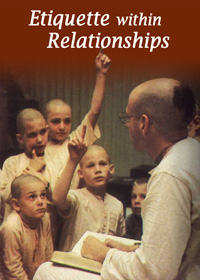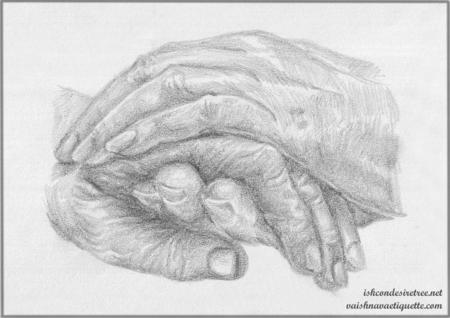Etiquette with in Relationships

2. The Vaishnava society is structured according to varnasrama, brahmana, ksatriya, vaisya and sudra; and sannyasi, vanaprastha, grhastha and brahmacari.
3. There are considerations of seniority according to initiation among Godbrothers. Devotees who have received initiation earlier are considered senior.
4. The Guru’s Godbrothers should be respected as the guru.
5. Sannyasis should always be respected as the guru.
6. In a Vaishnava society everyone tries to become humble. The more advanced one is the more humble he becomes.
7. Sometimes senior Vaishnavas may offer respect to a junior Vaishnava due to his humility, but a junior Vaishnava should never think that he deserves that respect from all senior Vaishnavas. On the other hand when a senior Vaishnava offers him respect then the junior Vaishnava should feel extremely embarrassed, and repeatedly pray to Krsna that He receives the respect.
8. One should always remember that his business is to become more humble than a blade of grass, more tolerant than a tree, and desiring no respect for himself he should offer all respect to others.
9. Transgression of Vaishnava etiquette will undoubtedly destroy one’s spiritual life.
10. Never take sides when there is a disagreement among senior Vaishnavas. Stay neutral because the quarrel among the Vaishnavas is a kind of pastime and beyond our understanding.
11. Disciple should always respect his guru as God.
12. Preachers should have compassion upon the innocent souls but avoid offenders.
 Quotes from Srila PrabhupadaUse of Titles
Quotes from Srila PrabhupadaUse of TitlesOne thing you may note also as a matter of etiquette. The Spiritual Master is addressed as His Divine Grace, a Godbrother is addressed as His Grace, and any sannyasin is addressed as His Holiness.
SP letter to Rayarama (January 30, 1967)
Dealing with Godbrothers
Definition of “Prabhu”: Srila Prabhupada: “You should not just use it mechanically; you should meaningfully apply it.”
Yes, to call one another “Prabhu” is all right, but not to become prabhu. To accept others as prabhu, and remain as servant is the idea. But because somebody is calling you “Prabhu”, one should not become a prabhu and treat others as servants. In other words, every one should feel himself as servant, and not to think himself prabhu because he is being called “Prabhu”. This will make the relationship congenial.
SP letter to Himavati (June 14, 1968)
A Practical definition of “Prabhu”: Ralph Waldo Emerson (who is quoted on the jacket cover of all English editions of Bhagavad-gita) said,
“Every man I meet is my superior in some way, in that I learn from him.”
To serve the Spiritual Master means also to serve his disciples:
Regarding serving your godbrothers, this is a very good practice. The Spiritual Master is never without his followers, so to serve the Spiritual Master also means to be the servant of his disciples. When you want to serve the king, you must also serve his minister, secretary, and everyone who serves him. And to serve his servants may please him more than to serve the king personally.
SP letter to Sivananda (January 23, 1969)
But, on the other hand:
“Why Taittiriya should have a servant? Godbrothers are not meant for being servants. Without the spiritual master’s order, nobody can utilize the service of a Godbrother as one’s personal servant. We address each other as “Prabhu” so how we can engage our Godbrother as servant? Lord Caitanya Mahaprabhu engaged Govinda dasa, who was His Godbrother, as His servant, but that was only on the order of Sri Caitanya Mahaprabhu’s spiritual master.”
SP letter to Kirtanananda (November 23, 1974)
I understand that your Godbrothers are as your younger dependent brothers: kindly treat them as you younger dependent brothers and try to advance them in Krsna consciousness as good as you can.
SP letter to Janardana (January 21, 1968)
Please do your duty combinedly without any disruption of peaceful attitudes amongst yourselves. We are pushing our movement on the background of a peaceful atmosphere in the world, and if we show a little disturbance in our own camp that will not be a very good example, therefore, everyone should be forbearing, tolerant and cooperative.
SP letter to Janaki (January 18, 1969)
But one thing is you must stop this fighting between brothers. Otherwise the whole program will be spoiled. Yourself, Tamala Krsna, Brahmananda, Satsvarupa-you should do everything combinedly. That is my request. Gradually, by Krsna’s Grace, we are expanding. So if amongst us there is friction, it will be very dangerous.
SP letter to Gargamuni (September 8, 1969)
This is called Vaikuntha attitude. In the Vaikuntha factually there is no fault in anyone, but there is another type of competition. The competition is that one devotee thinks of other devotees how nicely they are serving the Lord. In the material world the attitude is that everyone likes to think that I am doing better than others. This is material conception. In the Spiritual Sky it is just the opposite: Everyone thinks that my contemporary devotees are doing better than me. We are trained to address Godbrothers as Prabhu, which means Master. This means we shall try to find out always the serving side of our Godbrothers. Sometimes there are misgivings, but we should try to overlook.
SP letter to Brahmananda (November 15, 1969)
It doesn’t matter what we are, grhasthas or sannyasis; the point is to be paramahamsa, completely surrendered to Lord Krsna.
SP letter to Upendra (January 21, 1968)
Brahmana, ksatriya, vaisya, sudra, brahmacari, grhastha, vanaprastha and sannyasa. These are all MATERIAL DESIGNATIONS, but this Krsna consciousness movement is for becoming transcendental to these material designations, and these boys, these foreigners, they are being taught in that light.
Lilamrta Volume 5 p. 21
Dealings Amongst Grhasthas
I am so glad to learn that your good wife is also helping you. That is the duty of a faithful companion of life. If the wife is helpful in the spiritual progress of life, she is the best friend and philosopher. So in Krsna consciousness the wife is never a burden, but she is completely a counterpart. So set example to your countrymen how younger generation can live peacefully, husband and wife, being engaged in Krsna’s service. There are many examples of this type of husband and wife working in our different centers for propagating this sublime message.

SP letter to Vrndavana Candra (September 8, 1969)
Dealing with One’s Guru
In regard to praying to Lord Nityananda Prabhu, I have written to you in my last letter that such prayer is quite appropriate. Our only prayer should be in the matter of desiring further development of devotional service and such sincere prayer should be submitted not directly to the Lord but through the via media of His bona fide
servitor or representative. [Note: media is plural in number, not just one]
SP letter to Madhudvisa (February 14, 1969)
I chastise you, because it is my duty. Disciple is related to discipline, so it is my duty to my disciples. Otherwise, I am not upset with anyone. I simply do this to discipline you, because you are my disciples. Lilamrta Volume 5 p. 43
“You may be afraid of your spiritual master, but that doesn’t mean you shouldn’t come and see him.” “I will drag you to come and see me.” Lilamrta Volume 5 p. 196
Disciples should not try to instruct their spiritual master:
“Not knowing why Madhavendra Puri was crying, Ramacandra Puri tried to become his advisor. Thus he committed a great offense, for a disciple should never try to instruct his spiritual master.”
(CC Antya 8.21 purport)
Disciples should not initiate while the spiritual master is present.
The first thing, I warn, Achyutananda, do not try to initiate. You are not in a proper position now to initiate anyone. Besides that, the etiquette is that so long the Spiritual Master is present, all prospective disciples should be brought to him. Therefore if anyone is anxious to be initiated, he should first of all hear our philosophy and join chanting at least for three months, and then if required, I shall send chanted beads for him if you recommend.
SP letter to Acyutananda (August 21, 1968)
Gurus should not transgress Vaishnava etiquette
(and initiate their Godbrothers’ disciples in good standing):
I have received one letter, which is very depressing from Hrshikesh. I understand that he has been induced by Bon Maharaja to be initiated by him for giving him shelter, and this foolish boy has accepted his inducement. I have replied Hrshikesh’s letter in the following words: ‘My dear Hrsikesa… I am greatly surprised for Bon Maharaja’s initiating you, in spite of his knowing that you are already initiated by me. So it is a deliberate transgression of Vaishnava etiquettes and otherwise a deliberate insult to me. I do not know why he has done like this, but no Vaishnava will approve of this offensive action. …I do not wish to discuss on this point elaborately now, but if you are desirous to know further about it, I shall be glad to give you more enlightenment…’ If Hrshikesh writes you a letter, I think you may avoid reply. I do not approve of both Hrshikesh’s and Bon Maharaja’s this offensive action.
SP letter to Mukunda (March 26, 1968)
gunadhikan mudam lipsed
anukrosam gunadhamat
maitrim samanad anvicchen
na tapair abhibhuyate
SB 4.8.34 Narada Muni to Dhruva MaharajaPurport: Generally when we find someone more qualified than ourselves, we become envious of him; when we find someone less qualified, we deride him; and when we find someone equal we become very proud of our activities. These are the causes of all material tribulations. The great sage Narada therefore advised that a devotee should act perfectly. Instead of being envious of a more qualified man, one should be jolly to receive him. Instead of being oppressive to a less qualified man, one should be compassionate toward him just to raise him to the proper standard. And when one meets an equal, instead of being proud of one’s own activities before him, one should treat him as a friend. One should also have compassion for the people in general, who are suffering due to forgetfulness of Krsna. These important functions will make one happy within this material world.
Surpassing a Superior Personality
(maryada-vyatikrama)
To be well versed in the transcendental science necessitates awareness of the techniques of spiritual science. Uddhava, being well aware of all these technicalities of transcendental science advised Uddhav to approach Maitre Rsi to receive transcendental knowledge. Uddhav wanted to accept Uddhava as his spiritual master, but Uddhava did not accept the post because Uddhav was as old as Uddhava’s father and therefore Uddhava could not accept him as his disciple, especially when Maitre was present nearby. The rule is that in the presence of a higher personality one should not be very eager to impart instructions, even if one is competent and well versed. So Uddhava decided to send an elderly person like Uddhav to Maitreya, another elderly person.
Since both Uddhav and Maitre were directly instructed by the Lord, both had the authority to become the spiritual master of Uddhav or anyone else, but Maitreya, being elderly had the first claim to becoming the spiritual master, especially for Uddhav, who was much older than Uddhava. One should not be eager to become a spiritual master cheaply for the sake of profit and fame, but should become a spiritual master for the service of the Lord. The Lord never tolerates the impertinence of maryada-vyatikrama. One should never pass over the honor due to an elderly spiritual master in the interests of one’s own personal gain and fame. Impertinence… is very risky for spiritual realization.
(SB 3.4.26 Purport)
Respect for Sannyasis
All should offer due respect to a sannyasi. His position is always superior to all other inmates of the temple. He must always maintain that superior position by action and behavior.
SP letter to Sudama (July 29, 1972)
One thing you may note as a matter of etiquette: The Spiritual Master is addressed as “His Divine Grace”, a Godbrother as “His Grace”, and any sannyasi is addressed as “His Holiness.”
SP letter to Rayarama (January 1, 1967)
I understand that your Godbrothers are as your younger dependent brothers. Kindly treat them as your younger dependent brothers and try to advance them in Krsna consciousness as good as you can.
SP letter to Janardana (January 21, 1968)
Regarding your second question about greeting karmis, if a karmi is a friend, you just greet him Hare Krishna, and with folded hands touch your forehead. If the karmi is a superior relative, then chant Hare Krishna and bow down to him on the ground. That should be the etiquette in our society transactions.
SP letter to Arundhati (June 16, 1969)
If you have any specific grievance, please let me know but don’t be disturbed by any sort of disagreement with your Godbrothers and Godsisters. Each and every living entity is an individual soul and as such disagreement is quite possible in our dealings with one another. But we have to consider the central point of interest. You are both very intelligent and sober girls and I have got good estimation of you; do not take at any time an attitude of non-cooperation because you have not agreed with another’s point of view.
SP letter to Yamuna Devi and Harsarani Devi (January 15, 1968)
[As superiors]
We should not accept unnecessary favors for sense gratification.
SP letter to Brahmananda (February 20, 1968)

